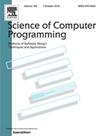An empirical study of code clones: Density, entropy, and patterns
IF 1.4
4区 计算机科学
Q3 COMPUTER SCIENCE, SOFTWARE ENGINEERING
引用次数: 0
Abstract
In recent years, there has been a growing consensus among researchers regarding the dual nature of code clones. While some instances of code are valuable for reuse or extraction as components, the utilization of specific code segments can pose significant maintenance challenges for developers. Consequently, the judicious management of code clones has emerged as a pivotal solution to address these issues. Nevertheless, it remains critical to ascertain the number of code clones within a project, and identify components where code clones are more concentrated. In this paper, we introduce three novel metrics, namely Clone Distribution, Clone Density, and Clone Entropy (the dispersion of code clone within a project), for the quantification and characterization of code clones. We have formulated associated mathematical expressions to precisely represent these code clone metrics. We collected a dataset covering three different domains of Java projects, formulated research questions for the proposed three metrics, conducted a large-scale empirical study, and provided detailed numerical statistics. Furthermore, we have introduced a novel clone visualization approach, which effectively portrays Clone Distribution and Clone Density. Developers can leverage this approach to efficiently identify target clones. By reviewing clone code concerning its distribution, we have identified nine distinct code clone patterns and summarized specific clone management strategies that have the potential to enhance the efficiency of clone management practices. Our experiments demonstrate that the proposed code clone metrics provide valuable insights into the nature of code clones, and the visualization approach assists developers in inspecting and summarizing clone code patterns.
代码克隆的经验研究:密度、熵和模式
近年来,研究人员对代码克隆的双重性质有了越来越多的共识。虽然一些代码实例对于重用或作为组件提取是有价值的,但是对特定代码段的利用可能会给开发人员带来重大的维护挑战。因此,明智地管理代码克隆已经成为解决这些问题的关键解决方案。尽管如此,确定项目中代码克隆的数量以及确定代码克隆更集中的组件仍然是至关重要的。本文引入了克隆分布(Clone Distribution)、克隆密度(Clone Density)和克隆熵(Clone Entropy,即项目中代码克隆的离散度)这三个新的度量来量化和表征代码克隆。我们已经制定了相关的数学表达式来精确地表示这些代码克隆度量。我们收集了一个涵盖Java项目三个不同领域的数据集,为提出的三个指标制定了研究问题,进行了大规模的实证研究,并提供了详细的数字统计。此外,我们还提出了一种新的克隆可视化方法,可以有效地描绘克隆分布和克隆密度。开发人员可以利用这种方法有效地识别目标克隆。通过回顾克隆代码的分布,我们确定了九种不同的代码克隆模式,并总结了有可能提高克隆管理实践效率的特定克隆管理策略。我们的实验表明,建议的代码克隆度量为代码克隆的本质提供了有价值的见解,并且可视化方法帮助开发人员检查和总结克隆代码模式。
本文章由计算机程序翻译,如有差异,请以英文原文为准。
求助全文
约1分钟内获得全文
求助全文
来源期刊

Science of Computer Programming
工程技术-计算机:软件工程
CiteScore
3.80
自引率
0.00%
发文量
76
审稿时长
67 days
期刊介绍:
Science of Computer Programming is dedicated to the distribution of research results in the areas of software systems development, use and maintenance, including the software aspects of hardware design.
The journal has a wide scope ranging from the many facets of methodological foundations to the details of technical issues andthe aspects of industrial practice.
The subjects of interest to SCP cover the entire spectrum of methods for the entire life cycle of software systems, including
• Requirements, specification, design, validation, verification, coding, testing, maintenance, metrics and renovation of software;
• Design, implementation and evaluation of programming languages;
• Programming environments, development tools, visualisation and animation;
• Management of the development process;
• Human factors in software, software for social interaction, software for social computing;
• Cyber physical systems, and software for the interaction between the physical and the machine;
• Software aspects of infrastructure services, system administration, and network management.
 求助内容:
求助内容: 应助结果提醒方式:
应助结果提醒方式:


